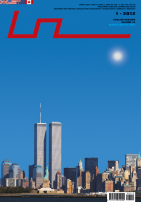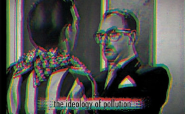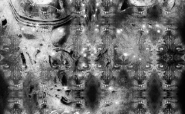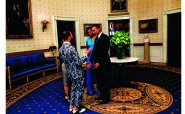| Revista Umělec 2012/1 >> State of the Union/The Last Word | Lista de todas las ediciones | ||||||||||||
|
|||||||||||||
State of the Union/The Last WordRevista Umělec 2012/120.05.2013 14:53 Tony Ozuna | america | en cs de |
|||||||||||||
|
Censorship could be defined as something that happens everywhere in the world, but not in America. There thus remains the need to explain those strange phenomena that readers of American newspapers sometimes encounter. We will ask Europeans; perhaps they will recognize something ancient in them.
In a recent The New Yorker issue (March 12, 2012), art critic Peter Schjeldahl revives a topic that has plagued me throughout this “American” issue of Umělec. Schjeldahl reviews the 2012 edition of the Whitney Biennial, but begins by referring back to what apparently in the opinion of most New Yorkers was the “worst ever” Whitney Biennial. NYC’s most revered Biennial was instituted in 1932. The 1993 show stands out to Schjeldahl, writing that “the notorious political-identity-mongering edition of 1993, which, come to think of it, really may have been the worst ever, producing a memorable spike in the fever chart of the art culture. (Buttons were handed out that read ‘I can’t imagine ever wanting to be white.’)” Then Schjeldahl segues into the most recent Biennial, which he loves. He calls it “enchanting.” “This year’s Biennial enchants—albeit darkly, in some cases,” he writes. Later he also points out that this year’s Biennial happens to have the same organizer (Elisabeth Sussman), “who, incidentally, curated the 1993 succes de scandale….” By the end of the review, Schjeldahl admits that this one (2012) may as well be “the best Whitney ever.” In other words, Elisabeth Sussman has finally grown up—she’s lightened up. No one is confused or even potentially offended. Mission successful. What interests me most here, however, and even disappoints me, is that The New Yorker goes out of its way not to name the artist responsible for the “scandalous” buttons. To not name the artist, intentionally—to make the artist a no-name, invisible, as if he/she were persona non grata, to be unworthy of mention (by name) in The New Yorker, for once snubbing the art establishment, is a low blow, a cheap shot. It is not censorship, because of course Americans do not do that. Americans instead monitor regimes that are censoring, and make these reports widely available. But to be dismissed or ignored or not named with spite is an insidious insult—probably just as satisfying as the glee that censors must feel in their little realms of power. I know the artist who Schjeldahl refuses to mention, and I can say that the works of our unnamed artist are anything but “enchanting” in the thirty years of his/her oeuvre. Absolutely nothing could be called “enchanting.” And this is all I will write here to describe this artist because in my previous attempt to describe this artist’s work for the American issue of Umelec, first through an interview, then an essay, proved to be unacceptable. As far as I am concerned, this issue is dedicated to the unnamed artist—the one who did not make the cut, though the cut could have been the deepest. “I am an artist that lives in Los Angeles, seems more than sufficient,” is how he referred to himself in our interview, instead of saying he’s “American.”
20.05.2013 14:53
Artículos recomendados
|
|||||||||||||






Comentarios
Actualmente no hay comentariosAgregar nuevo comentario